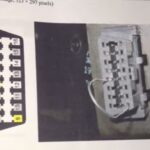Like many car enthusiasts, I’ve always been keen on understanding and fixing issues with my vehicles myself. When my Vauxhall Meriva B started experiencing low power mode, I knew I needed to delve into diagnostics. The dealer’s solution is often costly and sometimes overkill, so I turned to the world of OBD2 scanners, specifically looking at what Chinese Obd2 Scanners could offer.
My first foray was with a clone “Op-Com” device, designed for Opel/Vauxhall vehicles. The genuine article is a significant investment, but Chinese clones are readily available at very affordable prices. It’s crucial to be cautious with these clones; ignore those claiming inflated firmware versions. The latest reliable clone firmware for Op-Com is V1.71 with software V160115a. I opted for a higher quality clone from a reputable source within a Vauxhall forum, which offered support for setup – a definite plus.
This Chinese OBD2 scanner, connecting to both the OBD2 port and a laptop, proved invaluable. It quickly diagnosed my issue as a variable vane sensor calibration problem on the turbo, pinpointing a seized variable vane lever. A dealer would likely recommend a complete turbo replacement for this fault, as the sensor isn’t sold separately. However, simply freeing the lever resolved the problem entirely, saving a significant amount of money.
Later, when encountering high EGR readings and low DPF back pressure, my Op-Com clone again proved its worth. It indicated a hole in the DPF sample pipe, a part that officially costs around £100. The fix? An inexpensive piece of 8mm fuel pipe, a common and budget-friendly solution discovered thanks to the scanner’s diagnostic capabilities.
Driven by the desire to enhance my car with features from higher-spec models, I pushed the Op-Com to its limits. For more advanced modifications, I invested in a Chinese clone Tech2 unit. This is a clone of the professional tool used by main dealers for my car model (older models, as newer ones use MDI). Despite being a clone from China and costing significantly less than a genuine Tech2, it has performed flawlessly. It granted me access to every module in my car, enabling modifications, adding new components, and performing dealer-level calibrations that dealerships are increasingly reluctant to undertake for aftermarket upgrades.
While perhaps overkill for the average car owner, for someone passionate about automotive DIY and in-depth vehicle control, Chinese OBD2 scanners like Op-Com and Tech2 clones offer incredible value. They provide diagnostic power and control that rivals dealer tools, all at a fraction of the cost, making advanced car maintenance and modification accessible to enthusiasts and savvy owners alike.
